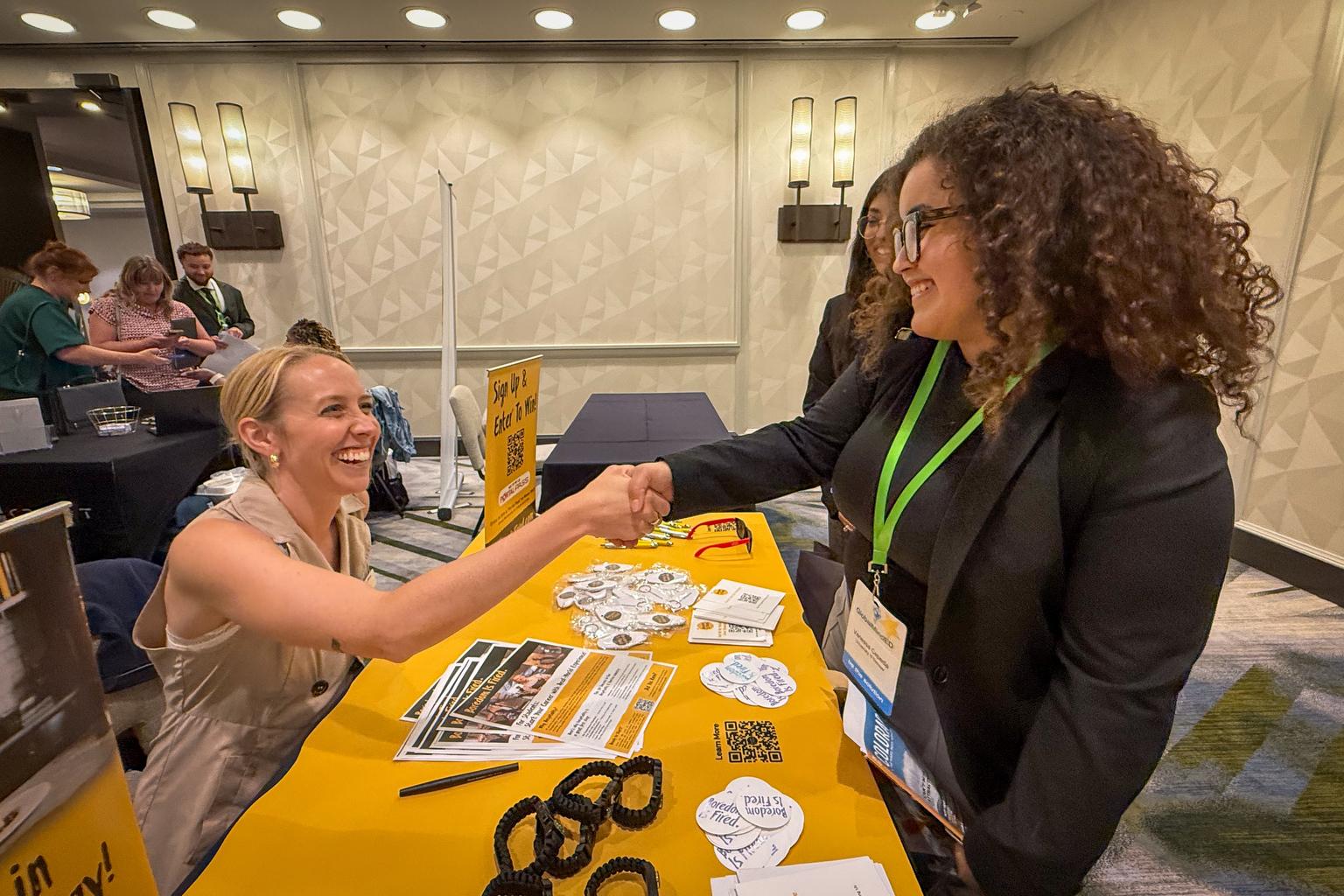
Inside a Denver hotel ballroom, students who are the first in their family to attend or graduate college are doing something out of the comfort zone of many of them. They’re making connections at a job fair — and trying to leave a good impression.
Ximena Valencia, 21, a marketing and art student at the University of Denver, says this kind of networking wasn’t something she learned about from her family.
“As Hispanics, coming from my culture, they don’t really teach us how to put ourselves out there,” she said.
Valencia is passionate about working in fashion design. She knows that dream job will be a long process. She swings by the Ritz-Carlton table and introduces herself, and tells the woman she’s interested in luxury brands.
“We have a wide variety of positions open — engineering, front office … We also have a spa, and that's very luxurious,” says the woman behind the table, handing Valencia a card with a QR code connecting to available jobs.
Valencia chit-chats a bit more and offers her résumé. She’s putting into practice tips she picked up at GlobalMindED’s 11th annual conference and job fair last week in Denver.
The nonprofit focuses on helping first-generation college students like Valencia build “social capital.” That means mentors, networks, and the kind of experience that isn’t always taught in class.
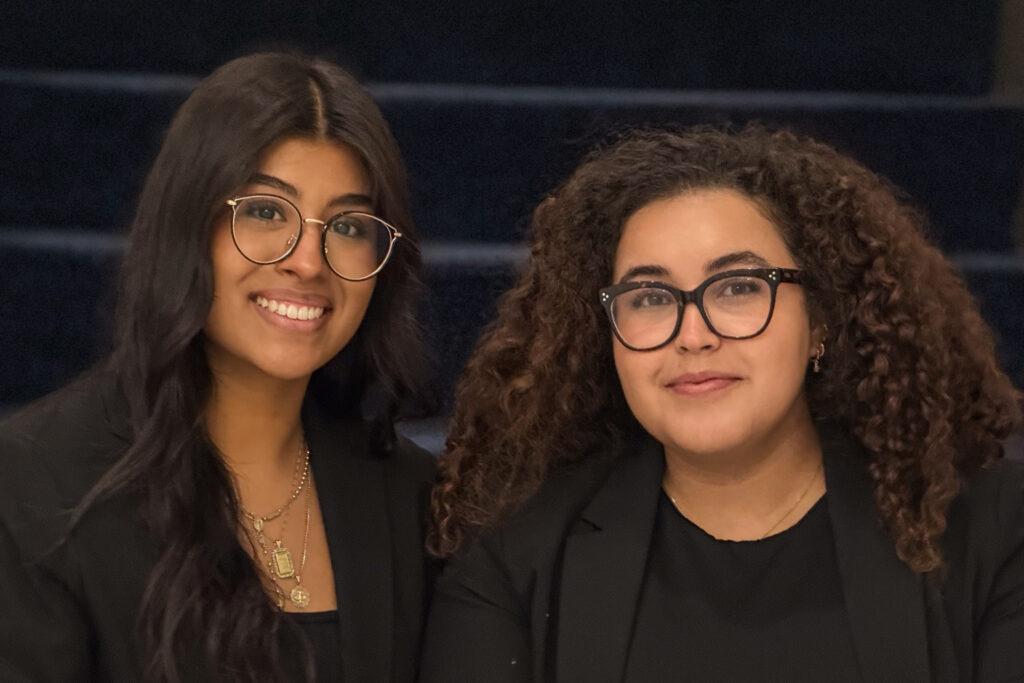
The three-day conference brought together industry, academic leaders and students from across the state and nation to discuss the current job market, how artificial intelligence is changing learning and working, and how best to snag internships and jobs. It was also a chance for GlobalMindED to work on its ambitious plan to close the gap between college and the working world for millions of students in the future.
Valencia’s friend Vanessa Cepeda, 20, who is studying international business with a minor in marketing and business law, has already picked up tips at the conference to practice at the job fair.
“Don’t go in without a game plan for who you want to meet, and then if you meet someone unexpectedly, you should always have your elevator pitch, you should always have something catchy about yourself,” she said.
College grads entering a tough job market
The job market is tightening for young people. Though Colorado still has a low unemployment rate, April hires dropped by 33,000. There’s now roughly one job opening for every unemployed person in the state. Two years ago, there were two. Experts say the current situation in some fields is even worse than after the 2008 recession.
The causes are many. There are government layoffs, tariff-related layoffs, and tech layoffs. Artificial intelligence is displacing some jobs. And President Trump’s targeting of diversity initiatives has led some companies to eliminate divisions that recruited diverse college students, according to Carol Carter, founder of GlobalMindED.
“We have people who have been laid off and they're in their 30s, 40s, and 50s, and they are also competing for those jobs with a lot more experience than some of the younger people might have,” she said.
Beyond the specialized skills many jobs require, just getting on a company’s radar can require connections most first-gen students don’t have. That’s where this conference comes in. The answer isn’t just in polishing a résumé or touting a GPA — it’s in showing up and networking.
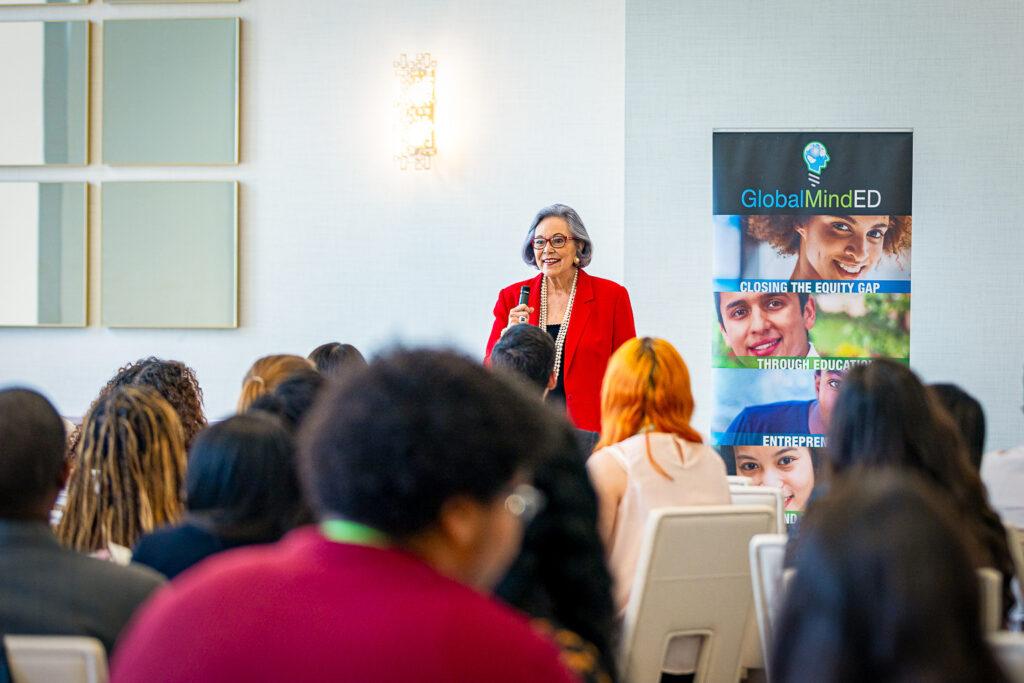
“Because they (employers) don't want someone that (just) has good grades, because anybody can do that,” Valencia said. “They want to know your story and they want to make sure that you are giving back to the community.”
GlobalMindED urges students to start their networking and other skill-building way before college graduation. College students need to build their leadership skills by joining something on campus, and it doesn’t have to be something that directly relates to the field they want to go into.
“Or you’re a barista at Starbucks – become an assistant manager,” Carter said. “You need to show how your initiative is helping you get to that next level.”
She said recent graduates need to be scrappy and innovative, piecing together two or three different things and they need to know how to articulate what they know how to do.
“The number one thing that young people need is strong interpersonal skills,” she said. “How we can best AI is by having super strong abilities with the human capacity to understand how to get things done through and with others.”
The strengths of first-generation students
While GlobalMindED is focused on helping first-generation students enter the job market with the same soft skills as the children of college graduates, first-generation students also have advantages. To make it through higher education, they have had to persist, find unique solutions to problems, and not give up when others might have, Carter said, critical traits employers look for.
JJ Mendez, a prelaw student at the University of Denver, knows that hustle. He’s worked at O’Reilly Auto Parts, Amazon, Dave & Buster’s, Chick-fil-A, Buc-ee’s gas station, all to “keep myself alive” and pay for school. He had to work through the doubts — “why do I deserve to go to college?” when nobody he knew had. But Mendez clearly remembers the day he spent nine hours working a paint striping job in a parking lot with his brother in 103-degree heat and realized, “I don’t think this is what I want to do with my life.”
The conference and his university mentors have given him confidence that, as he searches for internships, people will see past his lack of experience so far in a professional setting.
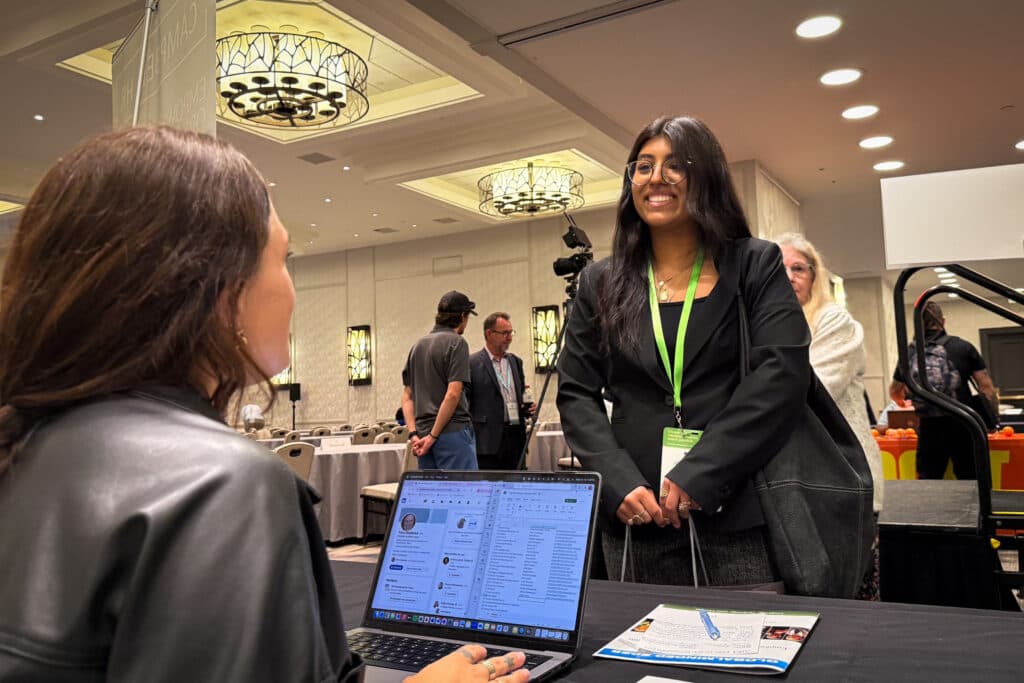
“There’s not a single lawyer in Colorado that won't sit down and have a coffee with you,” he said.
Valencia has the same drive.
“I had to teach myself everything to be able to get myself where I’m standing right now,” she said.
Her classmate Cepeda applied for 60 scholarships each month of her senior year of high school in order to land three to attend the University of Denver. Both young women volunteer at multiple university organizations to help students and the larger community. They say they’ve faced barriers —from feeling disconnected in rooms where no one looks like them to feeling like they don’t belong in certain spaces. But they’ve also tapped into something powerful: purpose.
“My ultimate goal is to become a diplomat,” said Cespeda, who came from the Dominican Republic to the U.S. as a child and knows three languages. “Of course, that is a long journey and a lot of requirements and a persona that you need to build, so in the meantime, I would also love to step into a marketing role for companies that I'm passionate about.”
The young women are also on the lookout for mentors who can help with the job application process, professional etiquette and networking strategies.
'I was in jeans, everyone else was in suits … I just instantly froze up'
Mentors are the reason Brian Ysasaga is where he is today. The 30-year-old clearly remembers the day he arrived at “Aerospace Day” at the state capitol eager to learn about the industry.
“I was in jeans, everyone else was in suits … I had never owned one before,” he said. “As soon as I walked in, I just instantly froze up and was like, ‘I don't belong here. I need to go home.’”
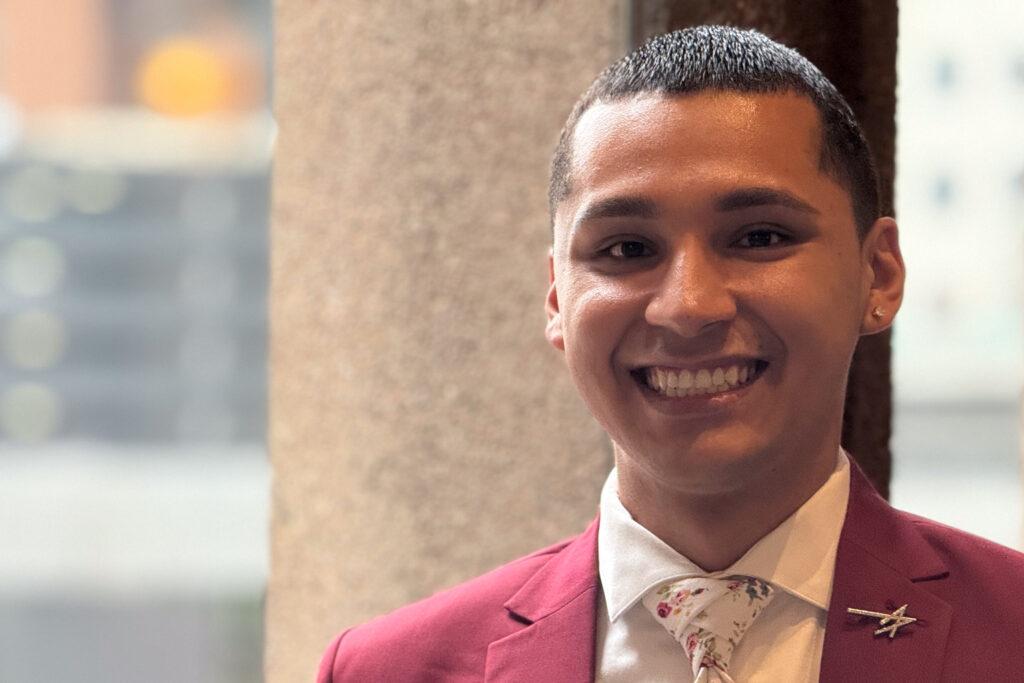
In the parking lot, Ysasaga ran into GlobalMindED’s Carol Carter. There was no leaving. She encouraged him to go back in and introduced him to people. Carter became a mentor; Ysasaga got involved in GlobalMindEd and connected with another mentor who’d retired from Lockheed Martin.
“He really helped open the door to networking events and coaching me as to how to interview, how to work on my résumé, projects to work on in school, classes to take, so he really helped shape my career.”
Ysasaga is now a system engineer for Lockheed Martin. It’s a long way from his rough upbringing in Texas, as a child moving from motel to motel, his father and brothers in and out of prison. A middle school principal helped Ysasaga understand that education was the key to breaking that “cycle of self-destruction.” Years later, GlobalMindEd taught him something else.
“It taught me that everybody belongs,” he said. “It gave me the confidence to go into an industry where minorities and people of color, women typically aren't in certain STEM fields. That really gave me the confidence to walk into rooms and to network with people.”
'I’m trying to have them remember me'
Back at the job fair, Vanessa Cepeda is putting everything she’s learned to work.
She stops by a table for the Ardent Grove Foundation, which offers low-cost mental health therapy and, as she pitches her marketing experience, manages to skillfully weave in the fact that she minored in psychology for her first two college years. The booth attendant mentions a part-time position that might be available and urges her to make a note of her graphic design skills on her résumé.
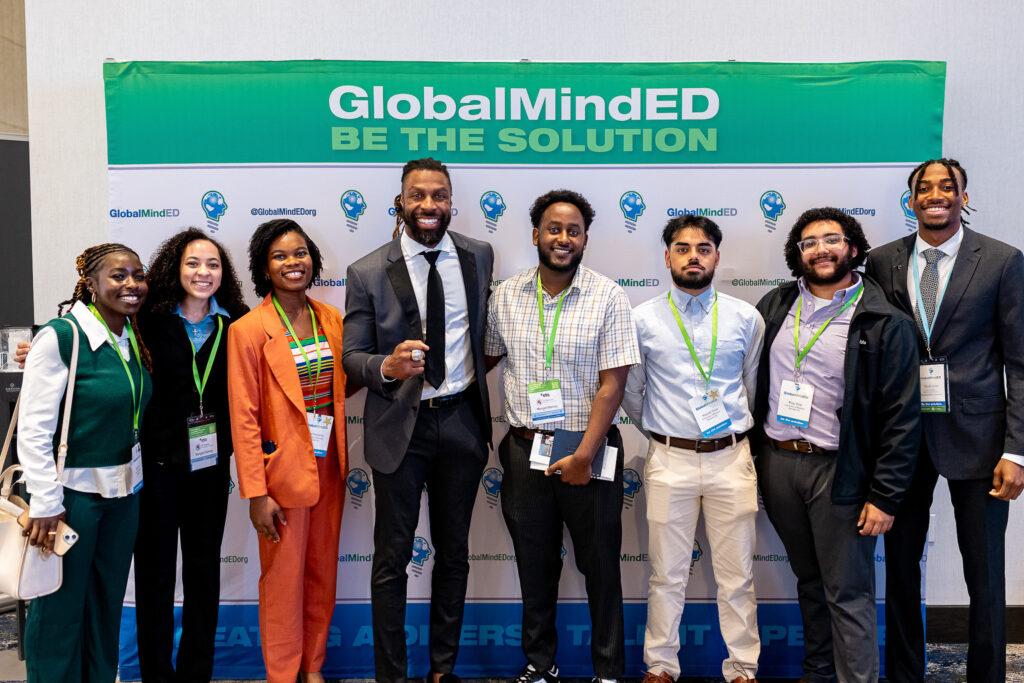
At another booth, for the city of Denver’s job site for young people interested in careers in tourism, leisure and hospitality, Cepeda deftly makes small talk about books she’s reading.
Cepeda said honing her networking skills is her main focus today — even if no one offers her a job.
“I’m trying to make an impression. I’m trying to have them remember me not for what’s on my résumé, not for what’s on my résumé, but the impression I made of just being myself.”









